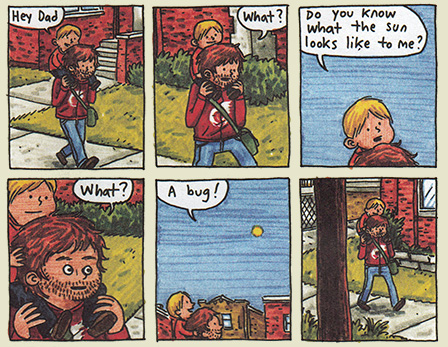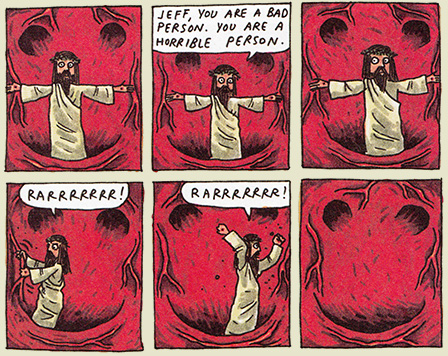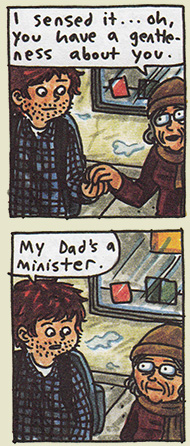A Matter of Life
Jeffrey Brown's A Matter of Life is collapsed between the terrifying vast expansiveness of the cosmos. Here the reader is recommended to the laughable insignificance of the human endeavor in the face of such grand celestial emptiness. Between these bookends, Brown recounts several dozen autobiographical moments, beautiful in their mundane simplicity. Each of these remembrances strains against both prologue and epilogue, threatening to undo our sense of how little we really are. We are shown, visually and rather powerfully, that we are little more than germs in the universal scope; but then Brown tells us trivial, page-long stories about how things were for him growing up and in his young adulthood. As if, after being shown the lie of human importance, we should care at all.

And the thing I most appreciated about A Matter of Life is that this tension seems to be Brown's point and purpose. The book is overlaid with a sense of cosmic horror that has nothing to do with Lovecraft or his successors. Because of his choice of universal scope at the bookends, there is always a sense of secular numinous haunting even episodes so innocuous as Brown's toddler son riding atop his shoulders. A Matter of Life is explicitly concerned with the mystery that subsumes the essential experientiality of the human creature in the face of the bright darkness of the extra-terrestrial expanse. Who is man that the universe should be mindful of him? Are we the Nothing that cold reason demands or the Everything that our hearts propose so forcefully through every minute of our lives? And then, what of the immortal, invisible, in light inaccessible? What about God?
In many ways, Brown's episodic memoir is an older man's version of Craig Thompson's seminal work. A Matter of Life is kind of like Blankets if you sucked out the vitriol, melodrama, self-importance, prodigy-level artwork, and narrative direction. In place of those gaping holes, let's inject warmth, a bit of circumspection, a slice of compassion for his religious parents, colour, and a touch of humility.
 My son did this to me tonight. It hurt a lot
My son did this to me tonight. It hurt a lot
There are a number of similarities between Brown's and Thompson's autobiographical avatars in these two books. Both have been alienated from the mainstream, conservative Christian faith of their parents. Both remember some dumb or mean things their parents did or said. Both have left their faith communities and maintain an awkward identity in proximity to those spaces. Both are still concerned with existential mystery and the absence of easy answers. But while Thompson's is a more majestic and memorable work (and one that will regularly grace Best of Comics lists for foreseeable decades), Brown's is a warmer, more pleasant experience. Save for a few moments, A Matter of Life will almost certainly prove to be a forgettable work—but that's okay because it's enjoyable while it lasts.
Part of the trouble (and I use trouble here mostly facetiously) is that where Blankets has a grand story to tell, full of pathos and symbology, Brown's story isn't concerned with that. He hops from one dis- or barely-connected story to another. Taken together they weave a tapestry that gives a sense to the tenor of his formative years, but—realistically enough—there is no plot, no climax, no central conflict, and no denouement. Life doesn't present itself in those structures and so Brown's story feels honest and forthright.
The part of A Matter of Life that struck me most notably when compared to the similarly themed Blankets was the absence of vitriol. I was going to say the markèd absence of vitriol, but then I remembered that there's no real reason we should expect so much frustrated rage from those who move out of dogmatic ideology into something else—even if that something else is another dogmatic ideology (as often happens11People are preposterously pendulous!). In a world of cool blue reason, we would simply accommodate new information and ideological shifts and go about our business living in new and better (maybe?) ways. But we're not usually like that. Our beliefs are attached to parts and pieces of our lives, relationships, and histories. Extricating ourselves from the communities that shared our former thought-governing paradigms can be a violent experience. We feel betrayed by those who shaped our former thoughts. They feel betrayed by our dismissal of what they tended so well. Outsiders feel judged by our conclusion that they are mistaken. We feel judged for our conviction that we were wrong. A lot of pain and passion circle these decisions, threatening constantly to devour our goodwill.
 Do you have jesus in your heart? Like, literally?
Do you have jesus in your heart? Like, literally?
I think time may be the best buffer to those hurts. At twenty-five, Craig Thompson was essentially just a kid when he wrote Blankets. For all its wonder and beauty, it reads as a book written by someone fresh from the college years, still on the edge of adulthood. Add a little more than a decade of life and family experience and you'll arrive at the tone of A Matter of Life. Brown and Thompson were both born in 1975 but Brown's book was written around 2012 while Thompson's was conceived beginning in 1999. Brown's wounds had a full decade of healing while Thompson's were fresh. Obviously, they are different people with different experiences and different temperaments, but I wonder what Blankets would have looked like had it been written today. It's possible that it wouldn't have been as good, that its strength comes from its passion and naïveté.
The greatest weakness of Blankets is in its epilogue, when Thompson kind of peters out his narrative into a helpless shrug against the beauty and mystery of the world. He doesn't know what to make of it and his new life apart from faith doesn't yet have the vocabulary to articulate his place in the cosmos. Brown, however, isn't a fresh apostate. He's worn the identity of the man apart for years now and he's (mostly22One of the more remarkable moments in A Matter of Life for me was when an elderly woman asks the adult Brown if he isn't a Christian. He hasn't been associated with his father's faith in years and generally he depicts himself with a sour face in response to efforts to draw him back into the fold. In this instance, however, Brown looks down at this woman and, with a certain spark of kindness, agrees that he is a faithful Christian and endures her Christianese and wishes her well after helping her cross the street. He wanted her to feel comfortable despite his own discomfort.
It shouldn't be striking to have read that—but since I had Blankets in mind while reading (it is a giant of the medium), I couldn't help but think how out of place such a scene would have been in Blankets' idiom.) comfortable in that skin. And so, when it comes to the unanswerable question about how he as an insignificant cosmic triviality fits in to a universal machine so grand and powerful and empty as his own, he with humility simply fades his anecdotes to black, allowing them to absorb back into the dark starfield of our ever-expanding universe.

A fade to black. A fade to lights. From mundane to mystery, from life to everything else. It's a good conclusion to a solidly conceived work. It doesn't satisfy as much as the neatly woven narrative of Blankets, but it isn't meant to. Thompson's is a story of anguish where Brown's is a story of love. Both treat faith and familihood. Both are some measure of autobiography. Both are good uses of the comics form and would be sustained perhaps by no other medium. I partly write this not because I will remember A Matter of Life, but so that I will remember to reread A Matter of Life.
Good Ok Bad features reviews of comics, graphic novels, manga, et cetera using a rare and auspicious three-star rating system. Point systems are notoriously fiddly, so here it's been pared down to three simple possibilities:
3 Stars = Good
2 Stars = Ok
1 Star = Bad
I am Seth T. Hahne and these are my reviews.
Browse Reviews By
Other Features
- Best Books of the Year:
- Top 50 of 2024
- Top 50 of 2023
- Top 100 of 2020-22
- Top 75 of 2019
- Top 50 of 2018
- Top 75 of 2017
- Top 75 of 2016
- Top 75 of 2015
- Top 75 of 2014
- Top 35 of 2013
- Top 25 of 2012
- Top 10 of 2011
- Popular Sections:
- All-Time Top 500
- All the Boardgames I've Played
- All the Anime Series I've Seen
- All the Animated Films I've Seen
- Top 75 by Female Creators
- Kids Recommendations
- What I Read: A Reading Log
- Other Features:
- Bookclub Study Guides










